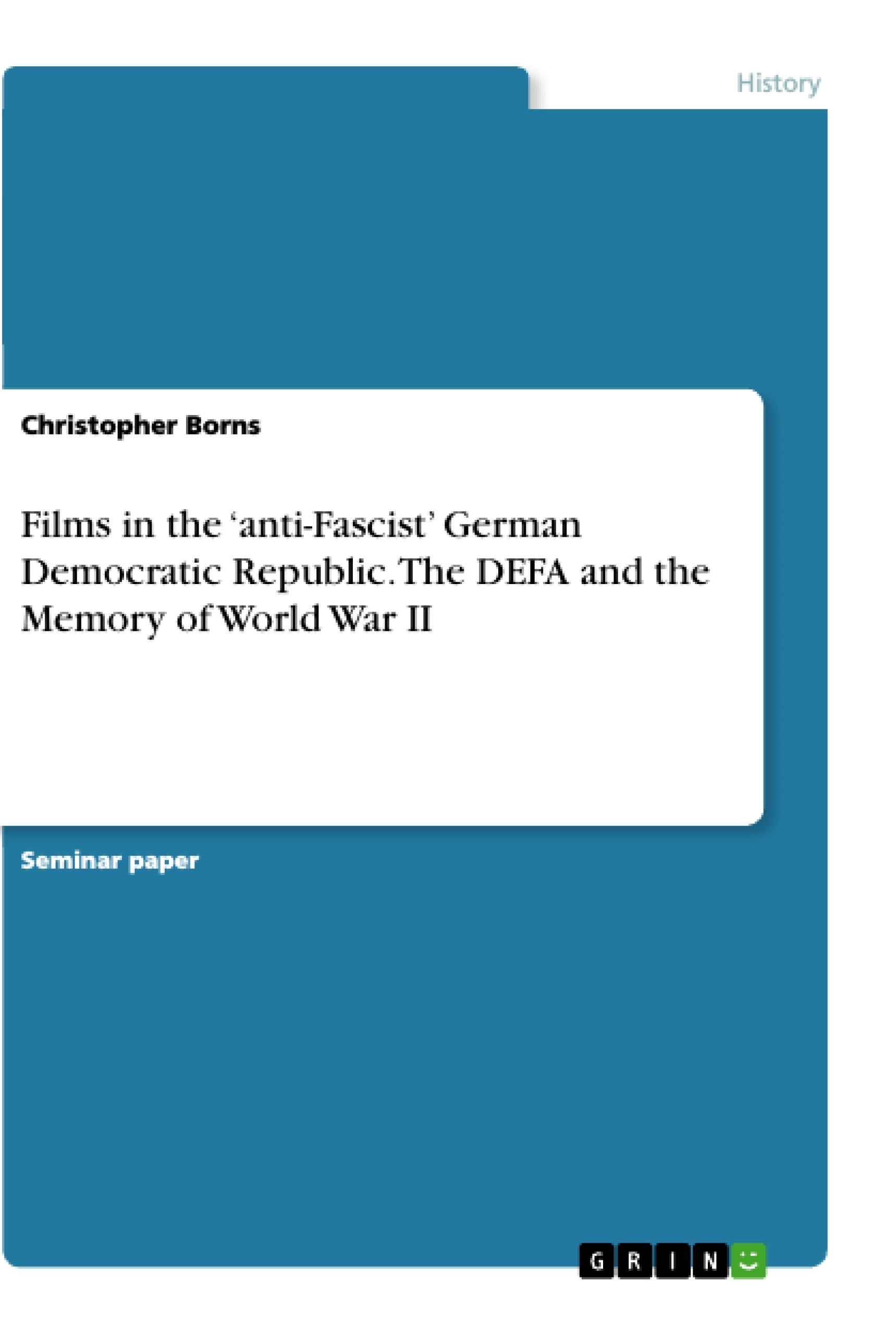During the process of the development in East and West Germany, the issue of the memory of World War II and the Nazi Past was discussed. Therefore, the GDR film institution DEFA was one of the first establishments which mainly published films shortly after 1945 to memorize the Second World War and the cruelties of the Nazis. But how important was the role of the memory of World War II for the GDR regime in reality? And would the GDR regime also try to use propaganda in films of such a sensible and important matter? Would it also try to spread its ideology within these movies? And if, how were ideological means implied in the movies respectively how did film makers conceptualize, frame and display their versions of World War II and its meanings?
To answer these questions the paper starts by giving an overview of the importance of the memory of World War II and the Nazi Past in GDR policy. After that, this policy should be further analyzed with the help of nine movies of GDR film makers and their contribution to the memory of World War II and the Nazi Past in East Germany. The conclusion is the last part of the paper.
Inhaltsverzeichnis (Table of Contents)
- Introduction
- The Memory of the Nazi-Past in the German Democratic Republic
- Analysis of ‘Anti-Fascist Films of German Democratic Republic Film Makers
- The Blum Affair (1948)
- Rotation (1949)
- Council of Gods (1950)
- The Axe of Wandsbek (1951)
- The Kaiser's Lackey (1951)
- Naked Among Wolves (1963)
- Carbide and Sorrel (1965)
- The Gleiwitz Case (1961)
- I Was Nineteen (1968)
- Conclusion
Zielsetzung und Themenschwerpunkte (Objectives and Key Themes)
This paper examines the role of World War II memory in the construction of the German Democratic Republic (GDR) as the "anti-Fascist" German state. It investigates how GDR filmmakers conceptualized, framed, and displayed their version of World War II and its meanings in their films.
- The importance of World War II memory in GDR policy
- The contrasting interpretations of the Nazi past in the GDR and Federal Republic of Germany (FRG)
- The role of GDR films in shaping the memory of World War II
- The use of propaganda in GDR films
- The portrayal of the Holocaust in GDR films
Zusammenfassung der Kapitel (Chapter Summaries)
The introduction sets the scene, discussing the historical context of the Cold War and the establishment of the GDR and FRG. It introduces the research questions and outlines the paper's structure.
Chapter 2 explores the significance of the Nazi past in GDR policy, highlighting the differences in how the GDR and FRG approached the memory of World War II. It discusses the influence of former socialist and democratic perspectives in shaping the GDR and FRG's respective interpretations of the Nazi past, and the role of the Soviet Union in influencing the GDR's approach.
Chapter 3 analyzes nine films produced by GDR filmmakers, examining how they contributed to the memory of World War II and the Nazi past in East Germany. The chapter explores the use of propaganda, the portrayal of the Holocaust, and the different ways in which these films framed the war and its implications.
Schlüsselwörter (Keywords)
The paper focuses on key concepts such as the memory of World War II, the Nazi past, anti-fascism, propaganda, GDR film, DEFA, and the Holocaust. It examines the relationship between the GDR's political ideology and its representation of the war in film, exploring themes of historical interpretation, national identity, and the use of film as a tool of cultural influence.
Frequently Asked Questions
What was the role of the DEFA in the GDR?
The DEFA was the state-owned film studio of the GDR, responsible for producing movies that shaped the national memory of World War II and the "anti-Fascist" state identity.
How did GDR films portray the Nazi past?
GDR films often used an anti-fascist lens, framing the war and Nazi cruelties to support socialist ideology and distinguish the GDR from West Germany.
Was propaganda used in East German WWII films?
The paper investigates how ideological means and propaganda were implied in movies to conceptualize the regime's version of history.
Which specific films are analyzed in this paper?
The analysis includes nine films, such as "The Blum Affair," "Naked Among Wolves," "The Gleiwitz Case," and "I Was Nineteen."
How was the Holocaust represented in GDR cinema?
The paper explores how filmmakers displayed the Holocaust and the meanings they assigned to these events within the GDR's political framework.
- Quote paper
- Christopher Borns (Author), 2009, Films in the ‘anti-Fascist’ German Democratic Republic. The DEFA and the Memory of World War II, Munich, GRIN Verlag, https://www.grin.com/document/987879



